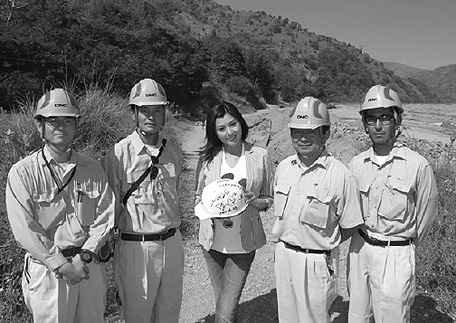Japan's Official Development Assistance White Paper 2011
Column 13
Supporting "Heart-to-Heart"
—Interview with Norika Fujiwara—
The following is an interview with Ms. Norika Fujiwara, actress and navigator of Chikyu (Earth) Voce, a TV program that introduces Japan’s international cooperation activities.
For reports on Chikyu (Earth) Voce, you have visited East Timor and Indonesia and seen the front lines of Japan’s support activities. What left the greatest impression on you?
The Muara Karang thermal power plant in Indonesia was making good use of Japanese technology, and the local technicians were sincerely grateful to Japan for it. This made me really proud to be Japanese. I had been to East Timor five years earlier, but on my latest visit, it struck me how the country itself was taking great strides forward. The streets were full of energy, and bridges and roads depicted the flags of both Japan and East Timor, furnishing visible proof that Japan's support was helping with the country's development. I also ventured from the capital of Dili to a rural coffee farm where an NGO from Japan was providing support. It was wonderful to see Japan’s aid extending beyond the capital to the remote countryside.
In the Great East Japan Earthquake, many developing countries expressed solidarity with and support for Japan—they chose this as a time to voice their gratitude to Japan for the support it has provided. How did this make you feel?
Soon after the quake and tsunami, support and rescue teams came from numerous countries, and I realized anew that Japan is with the world, that it can't exist alone. These countries' sending assistance is evidence that Japan's efforts up to then had taken root. That is, Japan's support had taken shape in that the recipients not only thanked the deed but also felt Japan itself with all their heart.
The Sri Lankan Ambassador to Japan and an Israeli medical team rushed over to the disaster-stricken region, and the Maldivian people sent cans of tuna double the number of their population. I was really glad to be able to introduce these feelings of warmth from around the world through Chikyu (Earth) Voce. Some viewers have sent comments along the lines of, "Now is not the time for Japan to be supporting the world," but I disagree. Looking at the support and sympathy we received in the wake of the recent disaster, I honestly felt that our support for foreign countries is for the good of Japan and of the future of Japanese children.
What do you hope to see Japan's international cooperation activities accomplish in the future?
I hope to see cooperation activities make everyone happy—both the giving side and the receiving side. Different people are good at doing different things. It would be ideal if the people offering cooperation can take pleasure in what they do and continue to do it. For instance, I always come back with renewed energy when I visit a developing country. The children's smiles and their enthusiasm about going to school teach me the importance of education. I like to take pictures and share my experiences with people in Japan. And I think that’s a good thing.
I also hope to see the Japanese people further tune into the circumstances of developing countries, and not be indifferent to them. Caring about helping people in developing countries is the first step to taking action. It's that perseverance to keep taking one step at a time, that conviction to overcome adverse conditions and continue that's important.

Delivering the "water of life": Ms. Fujiwara (center) with workers involved in improving the Timor water supply system
